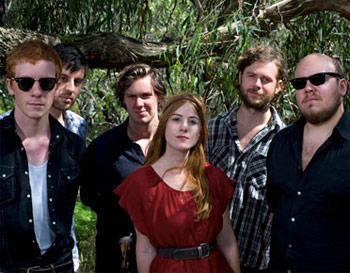The Vine interview: Rohin Jones of The Middle East, April 2011
An interview for The Vine. Excerpt below.
A sense of mystery has shrouded The Middle East’s musical career to this point. What we do know is that the indie-folk collective formed in Townsville, Queensland in around 2005, after the members found themselves constantly playing in each others’ bands. Core songwriters Rohin Jones and Jordan Ireland were drawn together out of a mutual desire to better themselves as writers; they assembled a team of collaborators around them to record their self-released debut, The Recordings of The Middle East, in 2008.
Though containing eight songs and running to 52 minutes, the band soon shied away from calling it their debut album. After releasing those eight tracks locally, the band amicably parted ways due to Ireland traveling to Europe. In the meantime, word escaped Townsville that The Middle East were worth hearing. Their debut landed on a desk at Spunk Records and – after the track ‘Blood’ was added to a Spunk singles comp, was deemed worthy of a 2009 re-release under the Spunk banner. After Ireland returned home, it seemed like a good decision to get the band back together.
Three songs were cut from the initial album for the EP, which (confusingly) retained the same name. But one, in particular, would reach ears across the world. A slow-burner in both musical nature and popularity, ‘Blood‘ (and its ethereal, fingerpicked cousin in ‘The Darkest Side’), soon attracted the ears of the nations broadcasters and wider music industry. Fans started flocking and soon ‘Blood’ was being heard on films, American television shows and TV commercials for European banks; it also polled at #64 in the triple j Hottest 100 of 2009. The Middle East then spent the majority of 2009 and 2010 touring Australia and the wider world, playing at the SXSW festival and picking up shows with the likes of Grizzly Bear, Mumford & Sons, and Doves. Despite their relative ubiquity among indie-folk circles, still little was known about the band.
April 2011 sees the release of their proper debut album, I Want That You Are Always Happy. Containing 13 new songs, it’s the sound of a young band pushing the boundaries of what they want their music to represent, as well as exploring their bands ability to create a united front. Three days after the album’s release, TheVine connected with a humble but semi-reluctant co-frontman Rohin Jones (he and Jordan Ireland are credited as the eight-piece band’s sole songwriters in the LP liner notes); a man whose answers are somewhat guarded and circumspect. Throughout our interview, “I don’t know” is a recurring response; he also has the curious habit of giving a sharp whistle when confronted with a question that prompts him to search his long-term memory.
We discuss the band’s mystery, democracy, religious undertones, their hometown of Townsville, an uncertain future and Jones’ (above right, second from right) secret hardcore past.
—
Rohin, you’ve been in this position before, where you’ve just released a collection of your music out into the world. What’s different this time around?
Umm… [laughs] Well I guess the first time we released, it was giving it out to 30 or 40 of our friends. It was a whole lot less vulnerable experience. That’s one big difference.
Is there a greater pressure or expectation placed upon the band this time around, or do you try to put that out of your mind?
I don’t think there’s any industry pressure; to ‘conquer the industry’, or be some big, successful act. I think the pressure of the last two years came from trying to produce something that we thought was credible, and up to our potential.
The first time I saw you was in March 2009, when you supported The Devoted Few at The Troubadour in Brisbane. I think that was right before you hit triple j airplay, and everything else that went with that. What do you recall of that time in the band’s career?
It was kind of fun. Jord had just come back from Germany, and we picked up where we left off; just playing around. It was nice to play music with old friends again, after having a bit of time off. It was a good time.
Was there a sense among the band that you could become bigger?
Not really, hey. I don’t know how to explain it, but… I didn’t expect that EP to [do anything beyond] just hearing it when I went home, because my parents were playing it. That’s about as much as I was thinking at the time. I don’t think we anticipated anything, to be honest.
That original LP release in 2008 is 52 minutes long. Do you consider it an EP, or an album?
I definitely don’t consider it an album. It’s definitely not good enough [laughs]. I guess we wrote a lot longer songs back then.
When you listen to that first release, what do you hear?
[Whistles] To be honest, I haven’t listened to it in years [laughs]. Usually I get super-close to projects when I’m working on them, so instead of hearing a song, I’ll just hear the mix between the two stereo guitars, or something like that. I’ll be like, “Ehh, we didn’t really get that right”. Or I’ll forget about a part, and go, “Oh, that’s right, that part’s in there.”
For the full interview, visit The Vine. For more on The Middle East, visit their website. The audio for their song ‘Jesus Came To My Birthday Party‘ is embedded below.
 Interview – The Middle East
Interview – The Middle East
very sad they broke up. really enjoy their music